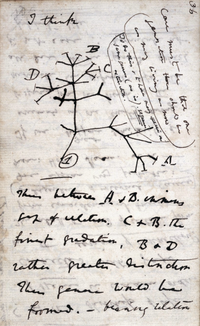
Photo from wikipedia
While ecological interactions have been identified as determinant for biological control efficiency, the role of evolution remains largely underestimated in biological control programs. With the restrictions on the use of… Click to show full abstract
While ecological interactions have been identified as determinant for biological control efficiency, the role of evolution remains largely underestimated in biological control programs. With the restrictions on the use of both pesticides and exotic biological control agents (BCAs), the evolutionary optimization of local BCAs becomes central for improving the efficiency and the resilience of biological control. In particular, we need to better account for the natural processes of evolution to fully understand the interactions of pests and BCAs, including in biocontrol strategies integrating human manipulations of evolution (i.e., artificial selection and genetic engineering). In agroecosystems, the evolution of BCAs traits and performance depends on heritable phenotypic variation, trait genetic architecture, selection strength, stochastic processes, and other selective forces. Humans can manipulate these natural processes to increase the likelihood of evolutionary trait improvement, by artificially increasing heritable phenotypic variation, strengthening selection, controlling stochastic processes, or overpassing evolution through genetic engineering. We highlight these facets by reviewing recent studies addressing the importance of natural processes of evolution and human manipulations of these processes in biological control. We then discuss the interactions between the natural processes of evolution occurring in agroecosystems and affecting the artificially improved BCAs after their release. We emphasize that biological control cannot be summarized by interactions between species pairs because pests and biological control agents are entangled in diverse communities and are exposed to a multitude of deterministic and stochastic selective forces that can change rapidly in direction and intensity. We conclude that the combination of different evolutionary approaches can help optimize BCAs to remain efficient under changing environmental conditions and, ultimately, favor agroecosystem sustainability.
Journal Title: Evolutionary Applications
Year Published: 2022
Link to full text (if available)
Share on Social Media: Sign Up to like & get
recommendations!